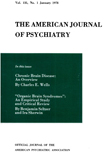Transient situational disturbances: course and outcome
Abstract
The validity and usefulness of the diagnostic category transient situational disturbance were evaluated by studying the course and outcome for 2,078 hospitalized naval personnel. The condition was found to be less severe and disabling than other major psychiatric disorders in terms of chronicity, length of hospitalization, and disposition. Outcomes in terms of rehospitalization rates and work effectiveness also were relatively favorable. Based on three or more years of follow- up, a substantial proportion of patients originally diagnosed as having a transient situational disturbance subsequently manifested personality disorder problems. The results suggest that clearer criteria are needed to define situational disturbances operationally and to identify patients with underlying personality disorders.
Access content
To read the fulltext, please use one of the options below to sign in or purchase access.- Personal login
- Institutional Login
- Sign in via OpenAthens
- Register for access
-
Please login/register if you wish to pair your device and check access availability.
Not a subscriber?
PsychiatryOnline subscription options offer access to the DSM-5 library, books, journals, CME, and patient resources. This all-in-one virtual library provides psychiatrists and mental health professionals with key resources for diagnosis, treatment, research, and professional development.
Need more help? PsychiatryOnline Customer Service may be reached by emailing [email protected] or by calling 800-368-5777 (in the U.S.) or 703-907-7322 (outside the U.S.).



